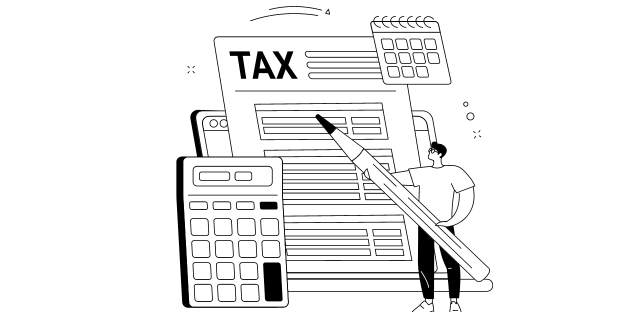Tax planning plays a vital role in every individual’s financial journey. The Income Tax Act of India offers various provisions and sections that allow individuals to minimise their tax liabilities and maximise tax benefits. By understanding and utilising these provisions effectively, one can significantly reduce their tax burden and optimise their financial planning.
Importance of maximising tax benefits
Financial security
By utilising tax-saving avenues, individuals can divert their savings towards creating a robust financial safety net, thereby enhancing their financial security.
Lower tax liability
Maximising tax benefits helps individuals reduce their overall tax liability, ensuring that they retain a larger portion of their hard-earned money.
Wealth accumulation
Efficient tax planning allows individuals to save and invest more, facilitating wealth accumulation over time.
Holistic financial planning
By optimising tax-saving strategies, individuals can integrate tax planning with their overall financial goals and achieve better financial well-being.
Encouragement for investments
The tax-saving provisions encourage individuals to invest in specific avenues, thereby channelising funds into productive sectors of the economy.
Tax-saving fixed deposits (FDs)
Fixed returns and safety
Tax-saving FDs offer fixed returns and are considered safe investments. They provide stable growth while ensuring capital protection. Example: Mrs Patel invests in a tax-saving FD that offers an interest rate of 6.5% per annum. She earns interest on her investment while enjoying the security of a fixed return.
Section 80C benefit
Investments made in tax saving FD for a minimum lock-in period of five years are eligible for deduction under Section 80C of the Income Tax Act, up to Rs. 1.5 lakh. Example: Mrs Sharma invests Rs. 1.5 lakh in a tax-saving FD. She can get this amount in the form of a deduction from her taxable income. This would reduce her tax liability.
Flexibility and liquidity
Although tax-saving FDs have a lock-in period of five years, some banks offer premature withdrawal options in case of emergencies, subject to certain conditions. Example: Mr Khan faces a financial emergency and needs immediate funds. He can withdraw his tax-saving FD prematurely, albeit with a penalty or reduced interest.
Secure investment for senior citizens
Senior citizens can opt for tax-saving FDs to earn regular income while enjoying tax benefits under Section 80C. Example: Mr Desai, a senior citizen, invests in a tax-saving FD to secure his retirement income and avail tax benefits simultaneously.
Compound interest
Tax-saving FDs often provide the benefit of compound interest, allowing individuals to earn interest on interest, thereby maximising returns. Example: Ms Gupta invests in a tax-saving FD that compounds interest annually. Over time, she benefits from the compounding effect, leading to higher overall returns.
Easy application process
Investing in tax-saving FDs is a hassle-free process. Individuals can open an FD account with their preferred bank, either online or through a physical branch.
Suitable for salaried individuals
Tax-saving FDs are particularly beneficial for salaried individuals who have a fixed income and want to reduce their tax liability. Example: Mr Kumar, a salaried employee, invests in a tax-saving FD to avail tax benefits and optimise his tax planning for the financial year.
Suitable for short-term goals
Note that tax-saving fixed deposits come with a lock-in of five years and is best for retail investors with a short-term investment goal, ensuring the benefit of tax deduction with capital growth. For instance, the Singh family plans to buy a flat in the upcoming five years. For this, they invest in tax-saving FDs to accumulate funds for the down payment while enjoying tax benefits.
Non-market linked
Tax-saving FDs provide a stable investment avenue unaffected by market fluctuations, making them suitable for risk-averse individuals. Example: Ms Sharma prefers to invest in tax-saving FDs instead of volatile market-linked investments to ensure the safety of her principal amount.
Automatic renewal facility
Some tax-saving FDs come with an automatic renewal feature, ensuring that individuals do not miss out on tax benefits even after maturity. Example: Mr Patel’s tax-saving FD matures, but he forgets to reinvest the amount. However, due to automatic renewal, his investment continues, securing his tax benefits.
Tax-saving term and health insurance
You may wonder, what is insurance? Insurance is a financial investment product designed to offer financial protection against potential uncertainties and risks. Read on the understand the benefits attached to a health insurance policy.
Comprehensive coverage
Tax-saving health insurance policies offer extensive coverage for hospitalisation, medical expenses, and critical illnesses, ensuring financial security during medical emergencies. Example: Mrs Reddy’s health insurance policy covers not only hospitalisation expenses but also provides benefits for pre- and post-hospitalisation costs, ensuring comprehensive coverage.
Section 80D deduction
Premiums paid towards health insurance policies for self, spouse, children, and parents are eligible for deduction under Section 80D. Example: Mrs Verma pays a sum of Rs 30,000 as a premium for her family’s medical insurance. She can claim this amount as a tax deduction from her taxable income.
Tax benefits for senior citizens
Individuals can avail additional tax benefits under Section 80D by paying health insurance premiums for their senior citizen parents. Example: Ms Patel pays health insurance premiums for her parents, who are senior citizens. She can claim the premium amount as a deduction from her taxable income.
Additional benefits
Some health insurance policies provide additional benefits like preventive health check-ups and coverage for alternative treatments, enhancing overall wellness. Example: Mr and Mrs Gupta’s health insurance policy covers an annual preventive health check-up, allowing them to stay proactive about their health.
Maternity coverage
Certain health insurance policies offer maternity coverage, including pre and postnatal expenses, ensuring financial support during pregnancy and childbirth. Example: Mrs Sharma’s health insurance policy covers her maternity expenses, including prenatal check-ups, hospitalisation, and postnatal care.
Cashless hospitalisation
Health insurance policies offer cashless hospitalisation facilities, wherein the insured can avail treatment without paying cash up front, reducing financial burden. Example: Mr and Mrs Kumar’s health insurance policy allows them to avail cashless hospitalisation in their preferred network hospitals, ensuring hassle-free medical treatment.
No claim bonus (NCB)
Tax-saving health insurance policies often provide NCB for claim-free years, wherein the policyholder receives a discount on the premium during renewal. Example: Mr Desai’s health insurance policy has been claim-free for three consecutive years. During the next renewal, he receives a 10% discount on his premium due to the NCB.
Tax benefits for critical illness policies
Premiums paid for critical illness policies also qualify for tax deductions under Section 80D. Example: Mr Singh invests in a critical illness policy that covers specific critical illnesses. He can claim the premium paid as a deduction from his taxable income.
Financial planning for unforeseen events
Tax-saving health insurance policies help individuals plan for unexpected medical emergencies, ensuring financial stability during difficult times. Example: Mrs Gupta’s health insurance policy covers critical illnesses. In case she is diagnosed with a critical illness, the policy provides a lump-sum payout, relieving financial stress.
Additional tax deductions
Individuals can claim tax deductions under Section 80D for preventive health check-ups and expenses related to disabled dependents. Example: Mr Verma incurs expenses for his disabled brother’s medical treatments. He can claim these expenses as a deduction from his taxable income under Section 80D.
Conclusion
Maximising tax benefits through tax-saving FDs and insurance plays a crucial role in optimising financial planning for individuals in India. By understanding the various tax provisions, one can reduce tax liabilities, secure their financial future, and achieve their financial goals effectively. Investing in tax-saving FDs and opting for the right insurance policies not only saves taxes but also provides additional benefits like fixed returns, safety, comprehensive coverage, and financial security. It is essential to assess individual requirements and choose the appropriate avenues to make the most of tax benefits and secure a financially sound future.

